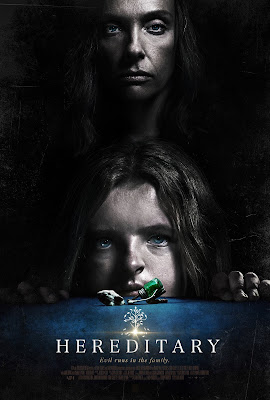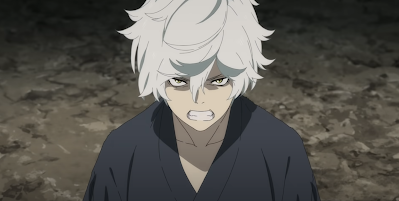50/50: Hereditary (2018)
Introducing 50/50!
Greetings, and welcome to the newest segment on my site called 50/50. This is a special undertaking for the year 2020, where I pick apart fifty films that I consider engaging, intriguing, and fun to discuss. All in the span of fifty weeks.
 This is not a countdown where one film on the list is pitted against the other in hopes of seeing which film is the best. No, these are just insights into movies that act as food for thought. So cutting back on the chit-chat, I hope that you will enjoy this cinematic buffet with me!
This is not a countdown where one film on the list is pitted against the other in hopes of seeing which film is the best. No, these are just insights into movies that act as food for thought. So cutting back on the chit-chat, I hope that you will enjoy this cinematic buffet with me!#7: Hereditary (2018) Or, Home Is Where The Harrowing Heart of Horror is
Horror films rarely discuss the fine line between grief and terror. Yes, there are a few that do—but for every, The Fly (1986), you have a plethora of slasher flicks filled to the brim with wisecracks and raunchy teens. Sex is one of those primal acts which is closely related to the lizard brain and our fight-or-flight survival mechanism upon which horror is dependent. But grief is widely ignored as a very close relative to that neurological on-off switch. And the subject of this 50/50 is Hereditary. This near-perfect horror film delves into the realm of grief and loss with acute terror that few scary movies have done.
Hereditary is one of the few movies which actually scared me. Not jump-out-of-my-seat scared, like a Chucky or Freddy Krueger flick (and all of the splashes of blood that come with it) but filled me with a sense of dread. By the time the end credits rolled, I was drained and sat in my dark room, contemplating what the hell I just experienced. In essence, I was a powerless observer, and that is a horrifying thought.
Hereditary, from the very beginning of the film, invokes this emotion with a slow burn. There are only a few films I have seen that do so; Salo being one of them (which will be discussed at a later point). The opening shot of the movie is of a dollhouse, it would all be so quaint and charming if not for the crawling pestilence of anxiety that the music invokes. That dollhouse is shown as the actual house of the Graham Family. The Graham's are about to attend the funeral of the Matriarch of the family, One by one, tragedy strikes the family after the funeral. This unveils a sinister destiny that they—unsuccessfully—try to avoid.
 The usage of a dollhouse makes the viewer feel like the Graham family is helpless to avert any negativity in their life. They are the toys of fate that are mere playthings, and there is nothing to be done about it. Toni Collette plays Annie Graham, a miniature artist who, in all honesty, should have won an oscar for her performance. Her descent into madness is one of the most tragic portrayals of a grief-stricken mother. And the symbolic usage of her career as a miniature artist fits perfectly into the feeling of helplessness. Annie spends a lot of her time crafting small replicas of things, in my opinion, as a means to escape the lack of control. My assessment of Annie is a common one, and that is a shame because a lot of the time when discussing this film, the other characters are ignored. Gabriel Byrne plays Steve, Annie's long-suffering husband, who is trying to be the glue that keeps the family together. Peter, their son, is played by Alex Wolff, who gives an underrated performance and plays a powerful role in the final part of the film. Then we have Charlie, played Milly Shapiro who, I swear, should be on a list for “creepiest little girls in horror films.” So active was her presence that she is utilized in every trailer and movie poster for the entire production.
The usage of a dollhouse makes the viewer feel like the Graham family is helpless to avert any negativity in their life. They are the toys of fate that are mere playthings, and there is nothing to be done about it. Toni Collette plays Annie Graham, a miniature artist who, in all honesty, should have won an oscar for her performance. Her descent into madness is one of the most tragic portrayals of a grief-stricken mother. And the symbolic usage of her career as a miniature artist fits perfectly into the feeling of helplessness. Annie spends a lot of her time crafting small replicas of things, in my opinion, as a means to escape the lack of control. My assessment of Annie is a common one, and that is a shame because a lot of the time when discussing this film, the other characters are ignored. Gabriel Byrne plays Steve, Annie's long-suffering husband, who is trying to be the glue that keeps the family together. Peter, their son, is played by Alex Wolff, who gives an underrated performance and plays a powerful role in the final part of the film. Then we have Charlie, played Milly Shapiro who, I swear, should be on a list for “creepiest little girls in horror films.” So active was her presence that she is utilized in every trailer and movie poster for the entire production.
On the technical side of things, Hereditary is rich in visual presentation. Aside from the vibrant use of miniatures cinematographer, Pawel Pogorzelski is in top form here. His effective utilization of light and shadow leads to some spooky, nerve-wracking visual tricks. Composer, Colin Stetson deserves a big round of applause for one of the most unsettling scores in a film that creeps up on you. The music of Hereditary is like a disease that slowly overtakes the body and with no hope of ever finding a cure. And as for creep factor, Hereditary does have its bloody scenes, make no mistake about it. But instead of constantly nauseating blood baths (which I am a fan of), Hereditary saves the blood for only the most shocking scenes. It depends more on a creepy vibe than anything. So when the gore comes to your way and hits—it hits hard! One of the scenes in the middle of the film, I had to pause and take a breather. Not because it was super gory but because the violence and the subsequent grief that followed was so gut-wrenching. When it comes to writing a strong horror narrative, Ari Aster really hits it out of the park with this debut.
Sadly, Hereditary will just be another statistic in the world of horror. That statistic (more like a curse) being that it received no awards from any of the mainstream critical outlets. Horror films, for some reason, will never be acknowledged by the Oscars and are at most nominated for technical purposes and never Best Picture. That honor is reserved for Silence of the Lambs. For a film with such prowess behind it, it is almost shocking that Hereditary would win nothing from the Academy. Oh well, what are you going to do?
 Remember when I stated that Hereditary is a near-flawless horror film? The first half of Hereditary is pitch-perfect, whereas the second half is just really really good. Without spoiling anything, the first half feels more like a reeling drama about a loss where every acting beat is portrayed with raw realism and in your face bleakness. The second half, where the darkness that haunts the Graham Family, is given more of a form. And while still chilling to the bone, for some reason is not as good as its predecessor, but comes very close. While penning this, I am having the hardest of times to not just divulge everything to the reader; it is very challenging to not spoil this film. And I could only discuss the film beat by beat, breaking it down for hours and explaining how the ending makes everything come full circle and compliments the sum of this film's parts.
Remember when I stated that Hereditary is a near-flawless horror film? The first half of Hereditary is pitch-perfect, whereas the second half is just really really good. Without spoiling anything, the first half feels more like a reeling drama about a loss where every acting beat is portrayed with raw realism and in your face bleakness. The second half, where the darkness that haunts the Graham Family, is given more of a form. And while still chilling to the bone, for some reason is not as good as its predecessor, but comes very close. While penning this, I am having the hardest of times to not just divulge everything to the reader; it is very challenging to not spoil this film. And I could only discuss the film beat by beat, breaking it down for hours and explaining how the ending makes everything come full circle and compliments the sum of this film's parts.
What can I say about Hereditary that hasn't already been said? I want Hereditary to be felt, to be experienced, and by god, you will feel the same sense of drainage after watching it. I felt the darkness linger within me long after the credits rolled, and so will you, goddammit!




Comments
Post a Comment